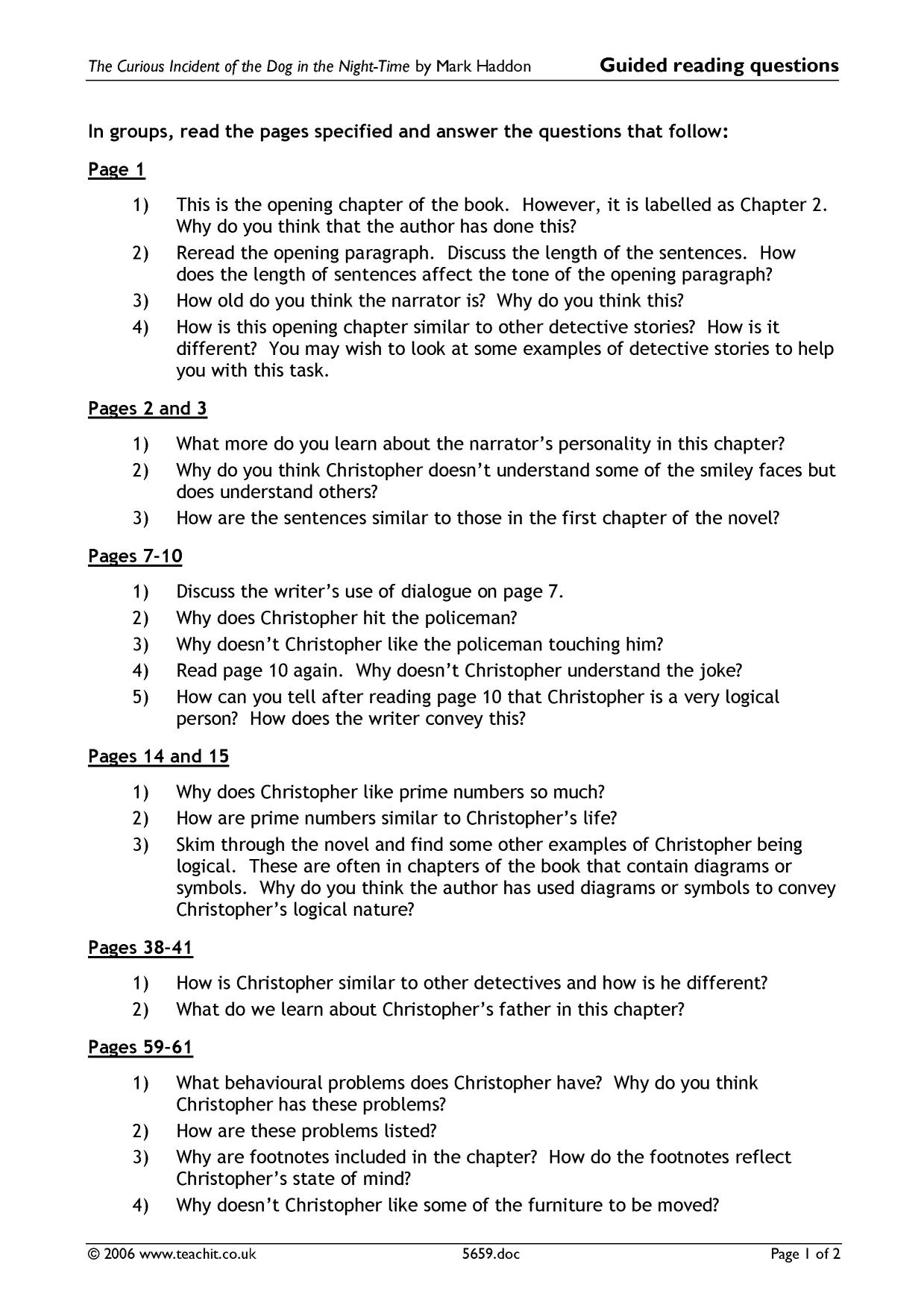Have you ever woken up in the dead of night to the sound of your dog padding around the house, sniffing at things, and generally acting like a nocturnal creature? It’s a common experience for many dog owners, and it can be both amusing and perplexing. While your furry friend may appear to be leading a secret life after the sun sets, the truth is that their nighttime antics are often fueled by a combination of instincts, boredom, and perhaps a dash of mischief.

Image: www.teachit.co.uk
This article will delve into the fascinating world of nocturnal dogs, exploring the reasons behind their nighttime behavior and providing insights into how you can manage their energy levels and ensure they get a good night’s rest. We’ll also discuss how to address potential anxieties or underlying health issues that might be contributing to their nocturnal escapades.
Unraveling the Mystery of the Nighttime Dog
Dogs are crepuscular animals, meaning they are most active during the twilight hours, both at dawn and dusk. This evolutionary trait is deeply rooted in their wild ancestors, who relied on these times of day for hunting and foraging. Even today, domesticated dogs retain some of these instincts, making them more alert and energetic during the transition periods between day and night.
Another contributing factor to your dog’s nighttime activity could be their sleep patterns. Dogs are typically polyphasic sleepers, meaning they sleep in multiple short bursts throughout the day rather than just one long stretch like humans. While this might seem inconvenient for you, it’s perfectly natural for your canine companion. So, if your dog is awake at night, it could simply be because they’re catching up on their rest.
But what about those dogs who seem to be wide awake and restless all night long? For those pups, a lack of sufficient exercise and mental stimulation during the day can lead to pent-up energy that has to be released, often in the form of nighttime shenanigans. This is particularly common with young, high-energy breeds.
How to Decode Your Dog’s Nighttime Behavior
To effectively address your dog’s nighttime behavior, you need to understand the underlying causes. It’s not always a simple matter of them being bored or restless. Here are some potential reasons why your dog might be awake and active at night:
Boredom and Lack of Stimulation:
Imagine yourself trapped indoors all day, with nothing to do but stare at the walls. Chances are, you’d be searching for ways to entertain yourself, too. Dogs are no different. If their days are devoid of mental and physical challenges, it’s only natural for them to seek excitement during their “off-hours.”

Image: www.theatrecrafts.com
Anxiety and Separation Anxiety:
Some dogs experience separation anxiety, a condition that causes them to feel distressed and anxious when separated from their owners. This can lead to barking, whining, pacing, and even destructive behavior, especially at night when they are alone.
Age:
Senior dogs can experience changes in their sleep patterns due to age-related health conditions, such as cognitive decline. This can lead to confusion, restlessness, and an increase in nighttime activity.
Medical Issues:
Certain medical conditions, such as infections, pain, or urinary tract issues, can also cause dogs to become restless and sleep poorly. If you notice a sudden change in your dog’s behavior, it’s best to consult your veterinarian to rule out any underlying medical problems.
Turning Nighttime Antics into Nighttime Sleep
Here are some strategies you can try to help your dog sleep better at night:
- Exercise and Enrichment: Provide plenty of physical and mental exercise during the day. This can include walks, playtime, training sessions, puzzle toys, and even interactive feeding time.
- Establish a Routine: Just like humans, dogs thrive on routine. Establish a regular feeding, exercise, and bedtime schedule to help your dog understand what to expect.
- Make Bedtime a Relaxing Ritual: Create a calm and relaxing bedtime routine by brushing your dog, giving them a treat, and then settling them into their crate or bed. Avoid high-energy activities in the hour leading up to bedtime.
- Consider a Crate: While crating isn’t everyone’s preference, it can be a useful tool to help dogs with separation anxiety, especially during the night. If done correctly, it provides them with a safe and secure “den” to rest in.
- Avoid Feeding Too Late: Reduce the chance of your dog waking up hungry by providing a light and early evening meal.
- Address Anxiety: If you suspect your dog is suffering from separation anxiety, consider consulting with a certified animal behaviorist or professional dog trainer for guidance and support.
- Rule Out Medical Issues: If you notice a sudden change in your dog’s behavior, schedule a veterinary checkup to rule out any underlying health issues.
Curious Dog In The Nighttime Pdf
Final Thoughts
The nighttime behavior of your dog can seem like a mystery at times, but understanding their instincts and the reasons behind their activity can help you create a peaceful sleep environment for all. By providing adequate exercise, mental stimulation, and a consistent routine, you can encourage your furry friend to embrace the night for the peaceful sleep it deserves. And if you’re still struggling with your dog’s nighttime restlessness, don’t hesitate to seek professional guidance from a veterinarian, animal behaviorist, or certified dog trainer. After all, a well-rested dog is a happy dog, and a happy dog is a joy to have around, both night and day.






